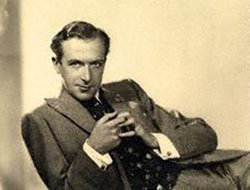
George Humphrey Wolferstan Rylands CH CBE (23 October 1902–16 January 1999) was always known as “Dadie” Rylands
I’ve been reading a good deal of the wicked, reactionary (and bisexual) British writer Simon Raven recently.
Raven’s politics assure that author’s neglect by precisely the same intellectual establishment his louche aestheticism would normally attract.
In his memoir, Shadows On The Grass, described by one reviewer as “the filthiest cricket book ever written,” the Anglophile reader finds a very entertaining account of the founder’s day feast at King’s College, Cambridge on December 6, 1948.
Raven falls into conversation with George Humphrey “Wills” (sic) Rylands, “the poet, the beauty, the wit, the actor, and the sage (one of the most notable lecturers in English at either university), the toast of the twenties and the ornament of the forties.”
Rylands serves up, in Raven’s account, some extremely witty deprecatory comments on the personalities and accomplishments of several of the great men of the college, in the artful manner characteristic of people of his particular persuasion, then suddenly grows serious, and expresses both loyalty toward and apt concern for the future of the ancien regime.
‘It would appear,’ he said, ‘that I’ve been very much running the Provost down this evening. In some ways it serves him right: it is an essential part of your education that you be taught to recognise the techniques of faking, whether in life or art. But there is one thing I very much wish to impress upon you all. So long as we have this Provost or someone like him as Head of the College, then absurd as he may be in many respects, we are nevertheless safe. Our values will be preserved. Festivals like this one will be properly celebrated. Honourable connections will be respected and maintained. It will continue to be recognised that it is better to give a place to an amusing or beautiful boy who will only get a third class degree (or may perhaps even fail) than to give it to some boring swot who might manage a second with the wind behind him. There will be diversity, and a certain amount of wealth. Wide interests will be encouraged as much as specialised studies; there will be tolerance and civility; in a word, there will be civilisation. The present Provost stands for and guarantees all of this.
‘But there is a new kind of man who will surely come to us in time. I’m not sure how soon; I suspect in about twenty years; but sooner or later come he will. This new sort of man will be a scientist, or possibly a practitioner of what I believe are called “social studies”; he will be a philistine and a prig; he will be left wing; he will wish to repudiate the past and to disown its monuments; he will be determined, as he will put it, to “cauterise” or “disinfect” the present, that is to sever all the old and well loved links, with people, with families, with institutions, so that the spirit which now obtains, having had its lifelines blocked or wrenched away, will die for want of nourishment. He will destroy and expel and pervert. For all I know, he may even let in women.’
I was myself at Yale both before and after coeducation, and am well acquainted and appreciative of the advantages thereof. I acquired a wife from the post-revolutionary coeducated Yale. But it is easy to understand why Dadie Rylands made reference to coeducation, treating it as a metonymy for all the vandalism and deracination that the spirit of leftism was determined to unleash on Trans-Atlantic elite universities as soon as the likes of King’s College’s provost had been replaced by men whose personal faith was only invested in progress and reform.





Please Leave a Comment!